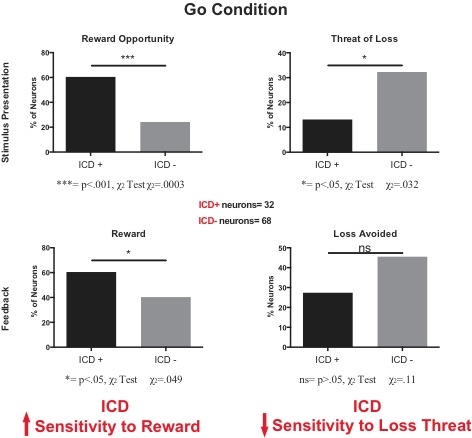Session Information
Date: Wednesday, June 22, 2016
Session Title: Parkinson's disease: Psychiatric manifestations
Session Time: 12:00pm-1:30pm
Location: Exhibit Hall located in Hall B, Level 2
Objective: 1) To determine if a subset of subthalamic nucleus (STN) neurons in Parkinson’s disease (PD) patients modulate activity in response to valence-related stimuli (reward/punishment) and 2) to identify differences in neuronal behavior associated with impulse control disorders (ICDs).
Background: ICDs can involve hypersensitivity to reward and hyposensitivity to loss that results in inappropriate action selection. New onset ICDs and worsening of preexisting ICDs have been observed following deep brain stimulation (DBS) of the subthalamic nucleus (STN), suggesting a role for the STN in reward/punishment processing and the pathophysiology of ICDs.
Methods: We intra-operatively recorded STN neurons in 25 PD patients while they performed a four-condition learning task (simultaneous and separate manipulation of valence and action). ICD status was assessed via structured clinical interview and the Questionnaire for Impulsivity in Parkinson’s (QUIP). To assess stimulus-related neuronal activity, we compared pre-stimulus baseline activity to post-stimulus activity using established methods.
Results: Activity from 100 well-isolated STN neurons was analyzed (ICD+, N=32; ICD-, N=68). We identified significant populations of STN neurons that responded to valence stimuli: opportunity for reward (41%), threat of loss (21%), reward receipt (49%), and loss avoidance (18%). Reward-responsive neurons were associated with movement-related modulation; loss-responsive neurons were associated with inhibition-related modulation. These associations corresponded to "act for reward" and "inhibit to avoid loss" performance biases. Importantly, neurons from ICD+ patients were less likely to respond to the threat of loss compared to ICD- patients (p<.05, chi square test) and more likely to respond to the opportunity for reward (p<.05, chi square test). 
Conclusions: Subthalamic neurons play a role in mediating valence processing during action selection in PD patients. Decreased responsiveness of STN neurons to the threat of loss correlates with impulsivity and this may provide an electrophysiological basis for the hyposensitivity to loss and hypersensitivity to reward associated with ICDs.
To cite this abstract in AMA style:
P.J. Rossi, A. Gunduz, M.S. Okun. Subthalamic neurons encode reward hypersensitivity and loss hyposensitivity in Parkinson’s patients with impulse control disorders [abstract]. Mov Disord. 2016; 31 (suppl 2). https://www.mdsabstracts.org/abstract/subthalamic-neurons-encode-reward-hypersensitivity-and-loss-hyposensitivity-in-parkinsons-patients-with-impulse-control-disorders/. Accessed April 20, 2025.« Back to 2016 International Congress
MDS Abstracts - https://www.mdsabstracts.org/abstract/subthalamic-neurons-encode-reward-hypersensitivity-and-loss-hyposensitivity-in-parkinsons-patients-with-impulse-control-disorders/
